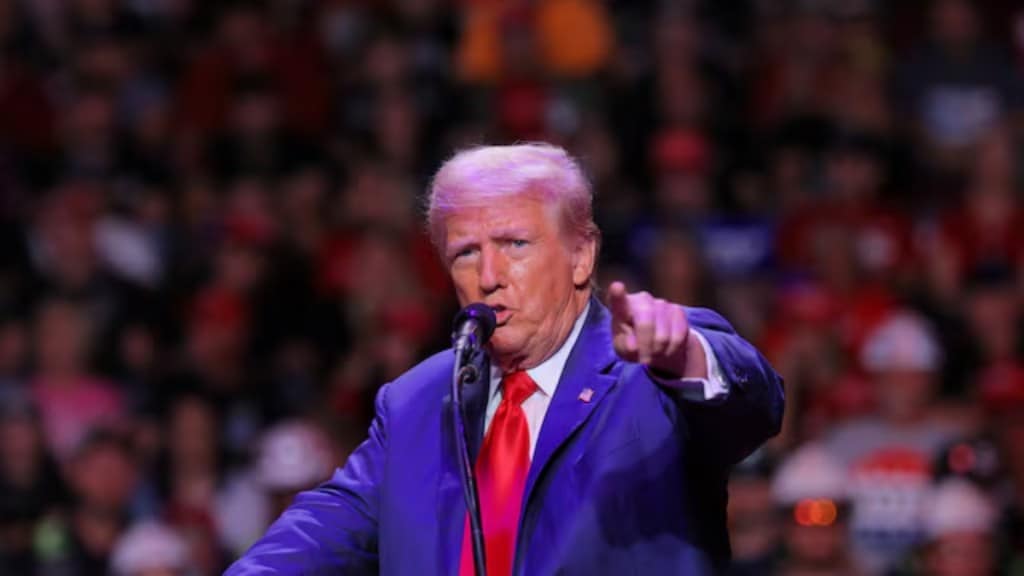Beijing has expressed strong disapproval of US President Donald Trump’s decision to impose a 10% tariff on Chinese imports, announcing plans to challenge the tariffs at the World Trade Organization (WTO). The Chinese government’s response came swiftly after the announcement, with officials criticizing the US move as a violation of international trade rules and stating their intent to take measures to protect China’s economic interests.
According to China’s Ministry of Commerce, the new tariffs represent a `serious violation’ of WTO regulations. The Ministry further highlighted that the tariff hikes would disrupt not only U.S.-China trade relations but also broader international economic stability. “The unilateral tariff hikes by the U.S. seriously violate World Trade Organization rules,” the Ministry said in a statement issued Sunday. “This move not only fails to address America’s own internal issues but also undermines normal China-US economic and trade cooperation.”
The Chinese government has also signaled its intention to take retaliatory actions. “We will take corresponding countermeasures to safeguard our interests,” the Ministry added, alluding to potential actions that could be taken against U.S. goods in return. The measures are seen as part of China’s broader strategy to defend its economic position on the world stage. The Ministry also urged the U.S. to address its domestic problems, particularly the opioid crisis, without resorting to trade threats.
A Response to Fentanyl Concerns
Trump’s decision to impose the new tariffs was made in response to what he described as China’s failure to curb the flow of fentanyl precursor chemicals into the US. Trump framed the move as a necessary step to protect Americans from the deadly opioid crisis. In a social media post, Trump explained that the tariffs were a national security measure, designed to reduce the impact of illegal drugs and illegal immigration.
“This was done through IEEPA because there is a great risk of death to our citizens due to illegal aliens and deadly drugs,” Trump wrote. “We need to protect the American people. Illegal aliens and deadly drugs, including fentanyl, are killing our citizens.” The president further clarified that the tariffs would be lifted if China took `adequate steps’ to address the opioid issue, specifically the illegal flow of fentanyl into the US.
Canada and Mexico Join the Response
The US tariff decision has also sparked sharp reactions from America’s neighbours to the north and south. Canadian Prime Minister Justin Trudeau condemned Trump’s move, pledging a retaliatory response. Trudeau announced that Canada would impose a 25% tariff on US goods worth $155 billion, with the first wave of tariffs “totaling $30 billion’’ set to take effect immediately. The second phase will impose additional tariffs on $125 billion worth of U.S. imports within three weeks, allowing Canadian companies time to adjust to the new trade environment.
“I want to speak directly to the Americans, our closest friends and neighbours,” Trudeau said in a statement. “This is a choice that will hurt Canadians, but it will also hurt you, the American people.” He highlighted the potential damage to American industries, particularly in auto manufacturing, stating that US auto assembly plants and other manufacturing facilities could close as a result of the tariffs. “Tariffs against Canada will put your jobs at risk,” Trudeau warned.
In Mexico, President Claudia Sheinbaum also reacted strongly to the new tariffs, ordering her economy minister to implement both tariff and non-tariff measures to protect Mexico’s economic interests. However, Sheinbaum reiterated her government’s preference for cooperation with the US, saying, “Our government seeks cooperation and dialogue with the United States, not confrontation.”
Justification and Economic Implications
Trump’s decision to impose tariffs on China, Canada, and Mexico marks a significant escalation in the ongoing trade war that has dominated much of his presidency. The tariffs are not limited to Chinese imports but extend to goods from Canada and Mexico, with a 25% tariff imposed on Mexican and Canadian imports, alongside a 10% tariff on Chinese goods. These moves are all part of Trump’s broader `America First’ agenda, aimed at protecting US industries from foreign competition and reducing trade deficits.
In his social media post, he wrote, “We need to protect Americans, and as President, it is my duty to ensure the safety of all. I promised in my campaign to stop the flood of illegal aliens and drugs from entering our borders, and Americans voted overwhelmingly in favor of it.”
However, this policy has faced significant backlash both domestically and internationally. Critics argue that the tariffs will lead to higher costs for American consumers, disrupt global supply chains, and result in the loss of jobs, particularly in manufacturing sectors. Some economists warn that the tariffs could lead to a prolonged trade war with severe consequences for the global economy.
As countries around the world respond to the US’s moves, the economic consequences of the trade war could become more pronounced, leading to higher prices, disruptions in global supply chains, and slower economic growth. The outcome of the WTO case, and the ability of countries to resolve their trade differences diplomatically, will likely play a crucial role in shaping the future of international trade relations.


